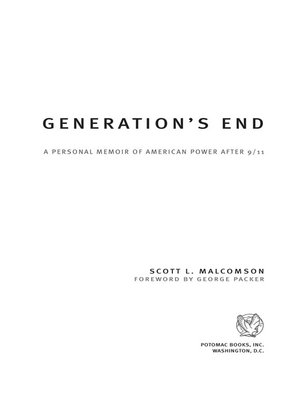
Sign up to save your library
With an OverDrive account, you can save your favorite libraries for at-a-glance information about availability. Find out more about OverDrive accounts.
Find this title in Libby, the library reading app by OverDrive.



Search for a digital library with this title
Title found at these libraries:
| Loading... |
As we approach the tenth anniversary of the 9/11 attacks, we have a chance to see more clearly how they were a turning point in America's relationship with the World. America became more assertive abroad; its authority and legitimacy as the only superpower became more widely opposed; and the limitations of the U.S.-dominated post–World War II international structures became more evident with each passing year.
The first half of Generation's End examines the aftermath of the 9/11 terrorist attacks through the invasion of Iraq in 2003. As the foreign affairs Op-Ed editor for the New York Times during this period, Scott L. Malcomson witnessed the newspaper's struggles to deal with the threats to its city and to American security. He captures the confusion and bravery of those times with disarming honesty while also providing insight into the shaping of American (and Times) policy.
The latter half takes Malcomson to Geneva, where in early 2003 he became senior adviser to the new UN High Commissioner for Human Rights, Sergio Vieira de Mello. When Vieira de Mello was selected as the UN's special representative for Iraq, Malcomson counseled him closely, writing strategy memos, speeches, and Op-Eds (including politically sensitive material revealed here for the first time). The killing of Vieira de Mello by al Qaeda in Baghdad, movingly evoked here by Malcomson, brings a measure of closure to a very brief but critical two years that, as George Packer notes in his foreword, "contain all the decisions that would set in motion the larger era." In an epilogue, Malcomson positions the Obama administration in the context of this formative period.






